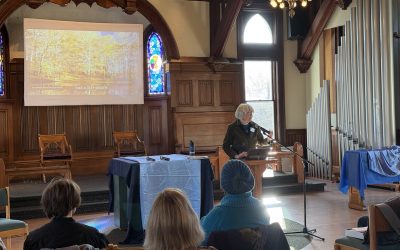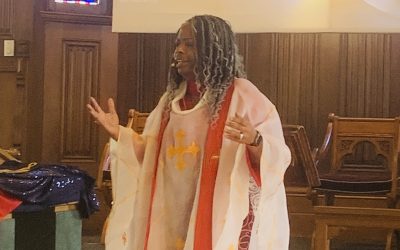The Science for Seminaries conversation informed the Theological School community of the social inequality consequences of technology
March 2022 – Drew Theological School hosted Technology x People: A Black Posthuman Sociotechnical Framework, a Science for Seminaries presentation on a Black posthuman sociotechnical framework as an approach for liberative spiritual revolt and justice-seeking in a digital age.
Enlarge

The rich discussion was led by Dr. Philip Butler, assistant professor of theology and Black posthuman artificial intelligence systems at Iliff School of Theology and founder of The Seekr Project, a Black conversational artificial intelligence with mental health capacities.
The event, spearheaded by Kate Ott, professor of Christian social ethics, and Hyemin Na, assistant professor of religion, media, and culture, was made possible by a generous grant through a Science for Seminaries seed grant from the American Association for the Advancement of Science (AAAS) Dialogue on Science, Ethics, and Religion (DoSER) Program and was co-sponsored by the Gospel Living and Social Transformation course at the Theological School and Drew’s Religion and Global Health Forum.
“Dr. Butler’s work is an important contribution to conversations in theology, Black studies, and cultural studies of artificial intelligence technology,” said PhD student Desmond Coleman. “The implications of his work should be of interest to anyone concerned with how the future of AI technology and the future of Black people might intersect—or diverge.”
Butler discussed the interaction between people and technology, stating that technology is for people because “humans had their chance,” explaining his theoretical separation between humans and people. “The human is a universal construct descending from a regional conglomerate of local context. In America, we call this whiteness.” People, on the other hand, are “local and complex, embodied and ancient.”
There is no static notion of what a human might be. “Whatever a human is relies heavily on whose definition of humanity is being deployed,” said Butler. “Humanity is the greatest identity politic of our time. When we talk or think about humans, we are probably talking or thinking about ourselves.”
Butler stated that current technologies and creators of humanistic technologies are meant to help humans—not people—transcend suffering, which is inadequate and divisive. “Dr. Butler enabled us to reimagine how our bodies can find liberation from the remnants of colonialism through the lens of transhumanism,” said Master of Divinity student Adrian Mendoza.
“Technologists are unaware of the potential ramifications that might occur outside the scope of the reality they inhabit or consider to be relevant to the technological process pipeline,” said Butler. “The consequences of progress are affecting other communities. A popular sentiment among technologists today is the idea that discriminatory biases, built into historically situated, presently existing, as well as emerging technologies, exists as an unintended consequence of technological construction.”
All students in the Gospel Living and Social Transformation class have subscriptions to The Seekr Project as part of the Science for Seminaries grant. “I am grateful for the opportunity to use Seekr to find liberation and discover our authentic deep selves,” said Mendoza.
Butler is the author of Transhuman liberation Theology: Technology and Spirituality and co-editor of Critical Black Futures: Speculative Theories and Explorations.
The lecture was followed by a robust Q&A session with the Theological School community.


